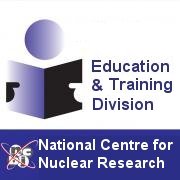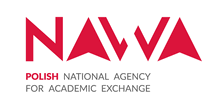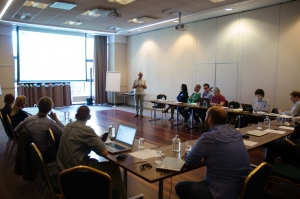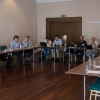State-of-the-art system monitors radioactivity of water supplied to the Warsaw municipal network
2016.07.07 8:38 - adminOutcomes of the TAWARA project have been evaluated on a meeting held in Warsaw (photo Marcin Jakubowski, NCBJ)
Real-time operation and speed of response are the most important advantages of an innovative system to monitor radioactivity of water fed to municipal water supply network. The system has been developed with participation of NCBJ scientists. Inhabitants of Warsaw are the first in the world who are protected by that state-of-the-art solution.
International team of experts met in Warsaw on July 4-6, 2016 to evaluate outcomes of the TAWARA-RTM (TAp WAter RAdioactivity Real Time Monitor) project granted by EU within the framework of the FP7 Security programme. The €3.6 million worth project took more than two years to accomplish. The developed system monitors radioactivity of water at the Northern Water Treatment Plant water intake in Wieliszew near Warsaw.
Capability to monitor potential radioactive contamination of water in real time is a big advantage of the system. Any alert indicating that permissible level of radioactive contamination in tap water is exceeded makes possible to immediately cut off water supplies and triggers prompt reaction of relevant agencies. That way the solution is capable to prevent radioactive contamination of the entire water supply system downstream the monitor. Simultaneously, any detected contamination is identified in another part of the solution by a gamma spectrometer developed in NCBJ. Identification of the contamination will help to adopt proper countermeasures. Continuous monitoring and speed of reaction is an essential difference in comparison with conventional systems, in which water quality was assessed on the basis of some samples periodically collected from selected points within the water treatment plant.
„Warsaw as the first city in the world is protected by a comprehensive system that is capable to monitor in real-time radioactivity of municipal water and by an innovative spectroscopy system capable to identify any detected contaminants” – said Professor Krzysztof Kurek, NCBJ Director General – „Detector capable to identify trace amounts of radioactivity in water – a part of that system – has been developed in our Institute”.
The system is based on three detectors. A probe containing the so-called early warning detector is supposed to generate an alert should any abnormally high gamma radiation level be detected at the water treatment plant water intake. The probe prevents the entire plant against becoming contaminated with any significant amount of a radioactive material. The next alpha/beta detector immersed in stream of the already treated water is capable to detect trace amounts of contamination. In case that latter detector has risen an alert, water is directed to the third detector: gamma spectrometer capable to identify isotopes responsible for the contamination.
The entire monitoring system has been designed with future expansion capable to monitor also biological and chemical threats in mind. Scientists plan to protect municipal water supply system also against cyber-terrorism.
„Tap water radioactivity real time monitor may be crucial for security of water consumers and is an important complement for water quality assurance systems employed by municipal water utilities. Continuous monitoring and speed of reaction may be a key feature in case of any terrorist threat” – points out Eng. Anna Olejnik, MSc, Chief Water Treatment Engineer in Warsaw municipal water utility.
Participants of the TAWARA RTM project include University in Padua, University in Pisa, ENEA Rome, the Scionix company from the Netherlands (manufacturer of dedicated scintillation detectors for science and industry), the CAEN SpA company from Italy (manufacturer of instrumentation for nuclear & particle physics), NCBJ Świerk, MPWiK (Warsaw municipal water utility) and the Wardyński i Wspólnicy sp. k. Warsaw-based legal company.



















